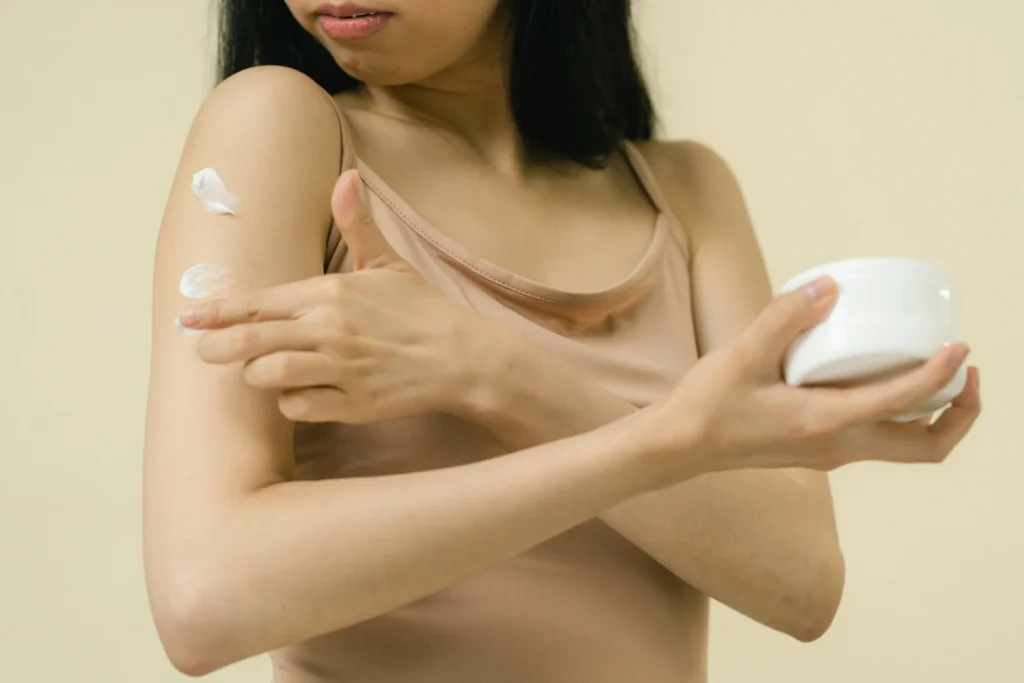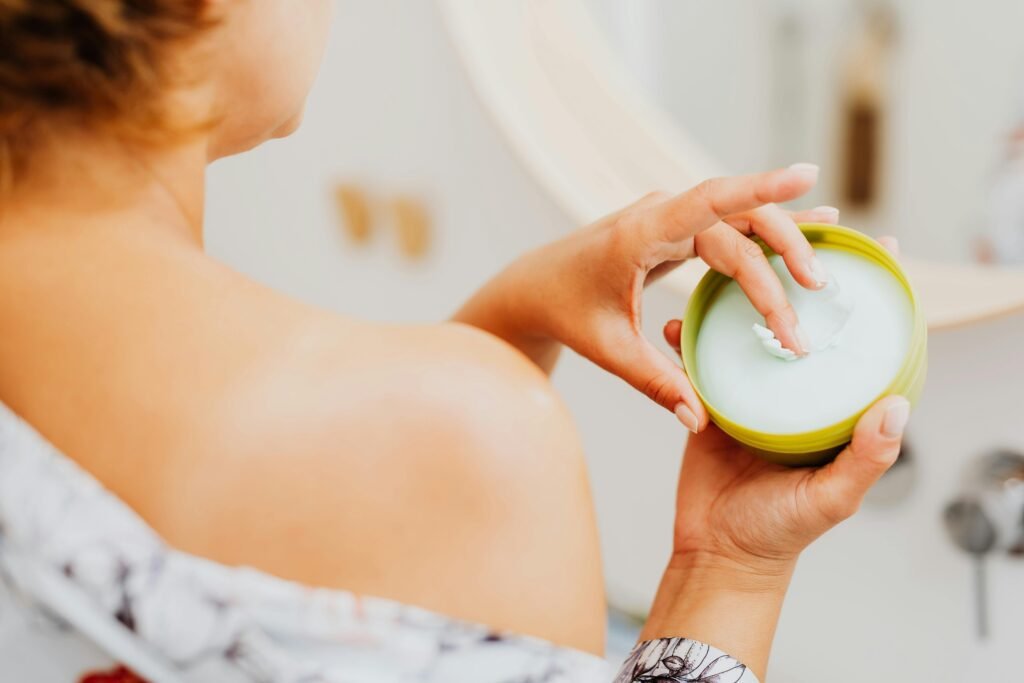Moisturizing is a crucial step in any skincare routine, but what if you’re in a pinch and only have body moisturizer on hand? You might wonder, “Can I use a body moisturizer on my face?” It seems like a harmless swap—moisturizer is moisturizer, right? Well, not exactly. Let’s dive into the differences, potential risks, and when (if ever) you can get away with it.
What’s the Difference Between Face and Body Moisturizers?

Face and body moisturizers may look similar and serve the same basic purpose—hydration—but they’re formulated differently. Here’s why:
- Thickness and Consistency – Body moisturizers tend to be heavier and thicker because the skin on your body is less sensitive than the skin on your face.
- Ingredients – Facial moisturizers are often formulated with non-comedogenic ingredients to avoid clogging pores, while body lotions might contain heavier oils, fragrances, and occlusives.
- Skin Sensitivity – Your face is more prone to irritation, breakouts, and reactions. Body moisturizers may contain ingredients that could be too harsh for delicate facial skin.
The Risks of Using Body Moisturizer on Your Face
Using body moisturizer on your face isn’t the worst thing you could do, but it’s not ideal. Here’s why:
It Might Clog Your Pores
Most body moisturizers contain occlusive ingredients like petrolatum and shea butter, which are great for sealing in moisture on your body but can be too heavy for your face. This can lead to clogged pores, blackheads, and breakouts.
It Could Cause Irritation
Body lotions often contain fragrance, dyes, and alcohols that can be irritating to your facial skin, especially if you have sensitive or acne-prone skin.
It May Feel Greasy or Uncomfortable
Facial moisturizers are designed to absorb quickly and feel lightweight. Body lotions, on the other hand, can leave your face feeling greasy, sticky, or overly shiny.
When Can You Use a Body Moisturizer on Your Face?
There are a few exceptions where using a body moisturizer on your face might not be a disaster:
- If the body moisturizer is fragrance-free, lightweight, and non-comedogenic.
- If your skin is extremely dry and you need an emergency hydration boost.
- If it contains skin-friendly ingredients like ceramides, hyaluronic acid, or glycerin.
But even in these cases, it’s best to switch back to a dedicated facial moisturizer as soon as possible.
The Best Alternatives to Body Moisturizer for Your Face
If you’re looking for proper hydration without the risks, stick to facial moisturizers suited to your skin type:
- For Dry Skin: Look for rich, creamy formulas with ceramides and hyaluronic acid.
- For Oily Skin: Choose lightweight, gel-based moisturizers labeled “oil-free” and “non-comedogenic.”
- For Sensitive Skin: Opt for fragrance-free and hypoallergenic moisturizers with calming ingredients like aloe vera or colloidal oatmeal.
Stick to the Right Product!

So, can you use a body moisturizer on your face? Technically, yes—but it’s not the best idea. Facial skin is more delicate and has different needs, so it’s always better to use a product specifically formulated for your face. Your skin will thank you for it!
Frequently Asked Questions: Can I Use a Body Moisturizer on My Face?
1. Can I Use a Body Moisturizer on My Face?
Technically, you can, but should you? Not really. Body moisturizers are designed for thicker, less sensitive skin, so they tend to be heavier, more fragranced, and sometimes even contain ingredients that might clog your pores or irritate your face. Facial skin is more delicate, prone to breakouts, and has different hydration needs than the rest of your body. A lot of body lotions include ingredients like mineral oils or heavy occlusives that are great for locking in moisture but can be a nightmare for your face, especially if you have acne-prone or sensitive skin. If you’re in a pinch and have nothing else, a tiny amount might be okay, but as a regular habit? Not the best idea.
2. Will Using Body Moisturizer on My Face Cause Breakouts?
It definitely can. Facial skin has way more sebaceous glands than the rest of your body, which means it’s already producing its own natural oils. Many body lotions are formulated to be ultra-hydrating, which is great for dry arms and legs but can be too much for your face, leading to clogged pores and breakouts. If your body moisturizer contains comedogenic (pore-clogging) ingredients—like certain oils, waxes, or butters—it’s basically setting up a breeding ground for acne. If you have sensitive or acne-prone skin, it’s always safer to stick with a lightweight, non-comedogenic facial moisturizer.
3. Is There Any Situation Where Using Body Moisturizer on My Face Is Okay?
Alright, let’s say you’re traveling, forgot your skincare bag at home, or you just ran out of your favorite face moisturizer. In cases like these, using a body moisturizer once or twice probably won’t ruin your skin forever. Just make sure the one you’re using is fragrance-free and doesn’t contain heavy oils or waxes. If it has ingredients like glycerin, ceramides, or hyaluronic acid (which are also found in facial products), you’re in the clear for a quick fix. But if your body lotion is packed with artificial fragrance, alcohol, or thick occlusives like petroleum jelly, it’s best to avoid it.
4. What’s the Difference Between a Face Moisturizer and a Body Moisturizer?
The biggest difference is the formulation. Face moisturizers are designed to be lightweight, easily absorbed, and often contain specific active ingredients targeted for issues like acne, aging, or hyperpigmentation. They’re also typically non-comedogenic, meaning they won’t clog your pores. Body moisturizers, on the other hand, are made to create a barrier on your skin to prevent moisture loss. They tend to be thicker, heavier, and more occlusive because the skin on your body doesn’t produce as much oil as your face. Also, body lotions often contain higher amounts of fragrance and preservatives, which can be irritating on delicate facial skin.
5. What Happens If I Accidentally Use a Body Moisturizer on My Face?
Nothing too dramatic—your skin isn’t going to peel off or anything. The worst that can happen is some clogged pores, extra oiliness, or mild irritation, depending on how sensitive your skin is and what’s in the lotion. If it’s a one-time mistake, just wash your face gently, follow up with a facial moisturizer, and move on. If you notice irritation, redness, or breakouts over the next few days, that’s a sign that the body lotion was a little too much for your skin to handle.
6. Can I Use a Natural or Organic Body Lotion on My Face?
“Natural” and “organic” don’t automatically mean “good for your face.” Even if a product is packed with plant-based ingredients, it can still be too rich, too heavy, or contain potential irritants. Essential oils, for example, are common in organic body lotions, but many of them (like citrus or peppermint oils) can be irritating to facial skin. That being said, if the ingredients are simple, non-comedogenic, and hydrating—like aloe vera, shea butter, or squalane—you might be able to get away with it for a day or two. Just don’t make it a habit unless you know it works for your skin.
7. What Should I Do If My Face Feels Dry But I Only Have Body Moisturizer?
If your skin is super dry and you’re desperate, go for it—but with caution. Use a tiny amount, warm it up in your hands first, and apply it lightly rather than slathering it on. If you’re worried about breakouts, you can mix it with a little water or aloe vera gel to make it thinner. Then, as soon as you can, get your hands on a proper face moisturizer. And if this happens often, maybe keep a travel-size face cream on hand so you’re never stuck in this situation again.
